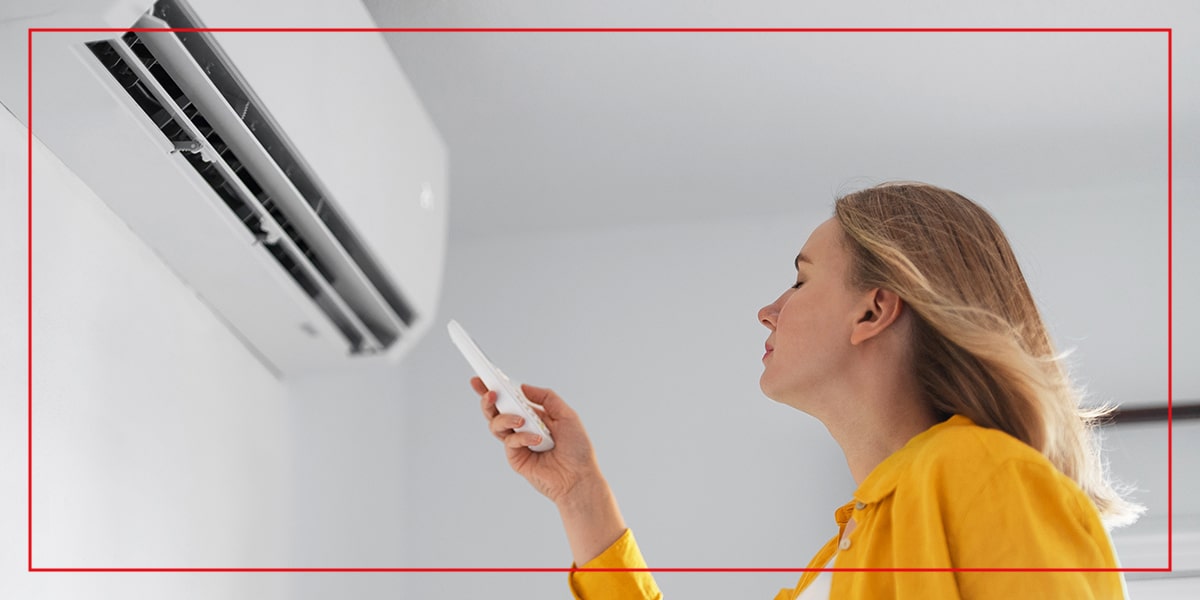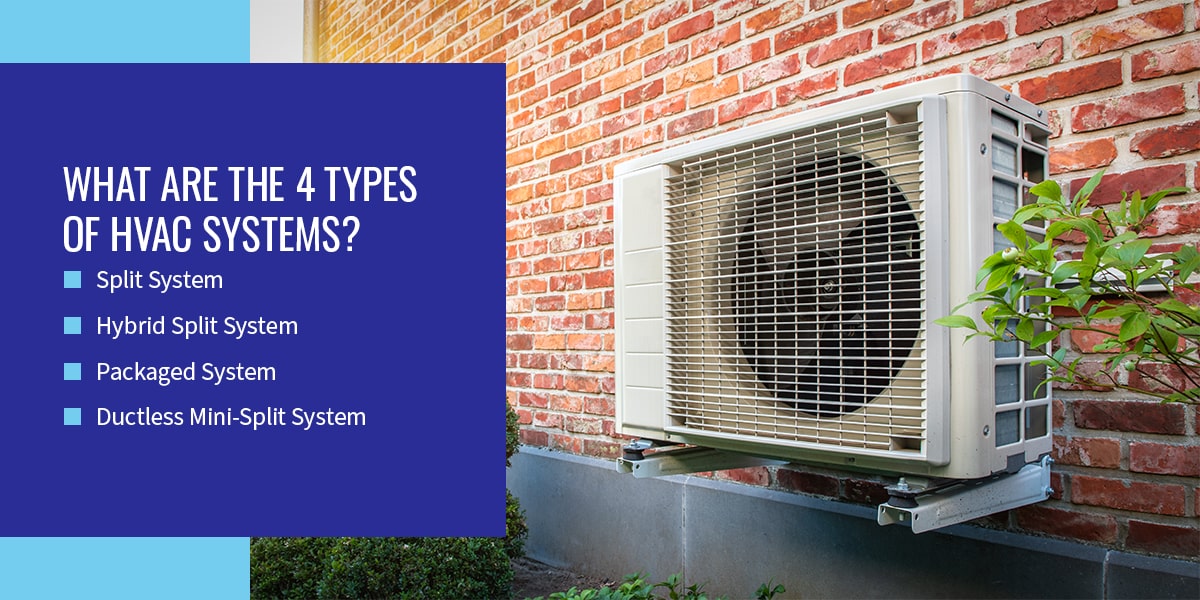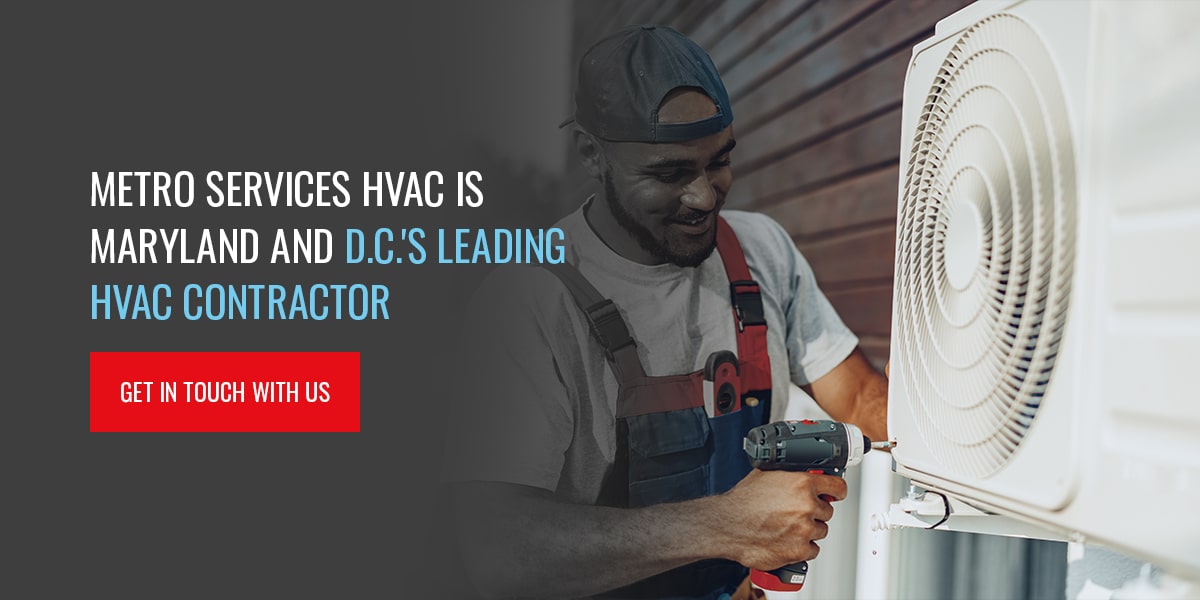HVAC Guide to Beat the Summer Heat in Maryland

Summers in Maryland can be brutal, causing home and business owners to utilize their Heating, Ventilation and Air Conditioning (HVAC) systems. Your HVAC system provides temperature control and ventilation throughout your building. Commonly, people refer to HVAC units as central heating and air conditioning systems. This can be misleading because not every HVAC system is the same.
Generally, when home or business owners run their AC unit heavily during the summer, it can increase the electricity bill or damage the unit, creating the need for HVAC technicians in Maryland to perform repairs. However, by understanding the different HVAC systems and following these tips, you can beat the summer heat without breaking the bank.

What Are the 4 Types of HVAC Systems?
Every HVAC system is either ducted or ductless. Ducted HVAC systems have a central unit that pushes air through air ducts to cool or heat a building, while ductless systems rely on alternative methods to distribute heated or cooled air throughout an area. The four main types of HVAC systems are split, hybrid split, packaged and ductless mini-split.
1. Split System
The most common type of HVAC system is a split system. Split systems consist of two units — one for heating and one for cooling. Professionals install the cooling unit outside, and it uses coils, compressors and refrigerant to create cool air while a fan directs hot air away from the building. This cool air travels through the ductwork and into your residence or commercial building.
Most split systems have the heating unit in a utility closet, basement or indoor storage area. The heater is gas-powered and uses a fan or evaporator to circulate hot air through the building via ductwork. You use a thermostat to control the indoor temperature.
Some pros of split systems include:
- The units contain air humidifiers and purifiers.
- Most split systems are noiseless, so the only sound you’ll hear is the air circulating throughout your building.
- Split systems are modern and sleek.
- Systems often pay for themselves through energy savings.
Some cons of split systems include:
- These systems are an investment, with higher upfront costs.
- A professional who understands the guidelines for HVAC systems must install it for your safety and to activate the warranty.
- They are only suitable for larger homes.
- The outdoor unit makes a lot of noise.
2. Hybrid Split System
Hybrid split systems function similarly to split systems, but they react to fluctuating temperatures and automatically heat or cool the home. These systems use a furnace and heat pump rather than an air conditioner. Additionally, the heating unit can run on gas or electricity.
The pros of hybrid split systems include:
- You can choose to use gas or electricity to heat your home.
- These systems are excellent for mild climates, so homeowners can take advantage of the electric heat.
- The system uses ducts and a thermostat, so it has all the benefits of a split system with the ability to lower your energy bills.
The cons of hybrid split systems include:
- They aren’t great at extracting heat from the outside air, so if temperatures are below freezing, your home might be chilly.
- These systems have a high upfront cost.
3. Packaged System
A packaged HVAC system has all the parts you need for heating and cooling your air in one unit. Some of the advantages of packaged HVAC systems include the following:
- Packaged systems are space savers. They can go on your roof or outside your home.
- These systems make maintenance easy, with all the main components of the unit in one location, except the ducts, which are throughout your home. This makes your
- Systems are easy to service for routine maintenance or repairs.
- Since the unit is outside, there won’t be a lot of indoor noise.
Some of the disadvantages of packaged HVAC systems include the following:
- The unit is all-in-one, so there are more opportunities for damage.
- Roof installation can be challenging.
4. Ductless Mini-Split System
Professionals install ductless mini-split systems in individual spaces, like offices, hotel rooms and apartments. Mini-split systems utilize an outdoor condenser and compressor, an indoor unit, heat pump, thermostat and refrigerant. One outdoor unit can connect up to nine indoor units via copper tubing. Since each indoor unit has a thermostat, it allows for individual temperature control.
The pros of mini-split systems include the following:
- They’re excellent at heating and cooling individual rooms.
- Professionals can install them with ease.
- These units save energy because they only heat or cool the room they’re in.
The cons of mini-split systems include the following:
- They’re expensive to install and repair.
- The units are more obvious than other types.
- Mini-split systems require regular maintenance.
Tips for Beating the Heat
Maryland’s summers vary from mild to hot, and the average temperature is 72.7 degrees Fahrenheit. The state’s eastern and southern areas have greater levels of humidity. Home and business owners must rely on their ACs on hot days. No matter what unit you have, when it runs constantly, it can increase your energy bills. Here are some tips for beating the heat and lowering your energy bills:
- Use your air conditioner strategically: Using your air conditioner frequently can increase your energy bills. To use your air conditioner less, you can use fans to increase air circulation, set the unit to a higher temperature and use an automatic run setting. It’s always recommended to use the automatic fan settings on your air conditioning units to prevent your AC from freezing.
- Use your windows: Close your blinds during the day to keep out sunlight. Window treatments like blackout curtains can also help regulate the inside temperature. At night, you can open your windows to let in cooler air. Additionally, you can invest in high-impact windows to filter out the heat.
- Maintain your AC: It’s crucial to schedule regular maintenance for your AC unit. This extends its life span and ensures it functions properly, requiring less energy.
Metro Services HVAC Is Maryland and D.C.’s Leading HVAC Contractor
When you need air conditioning and humidity control service in Frederick County or surrounding areas, look to Metro Services HVAC. We have over 20 years of experience in providing our expert, high-quality services. Our technicians offer routine maintenance, complete AC or heater installation, plumbing and repair services. Whether you want a new ductless mini-system or to maintain your AC before the summer hits, you know who to call.
Metro Services HVAC offers free estimates and same-day services, so you don’t have to go without heating and cooling for very long. Contact us today to discuss your Howard County HVAC service needs. Our team looks forward to working with you.

